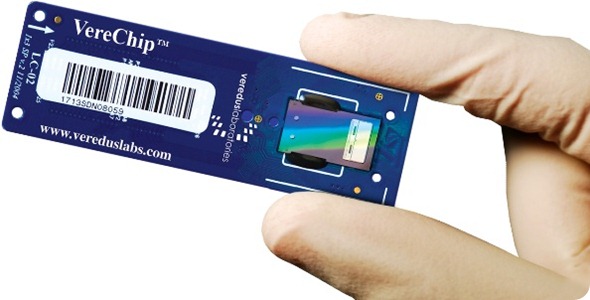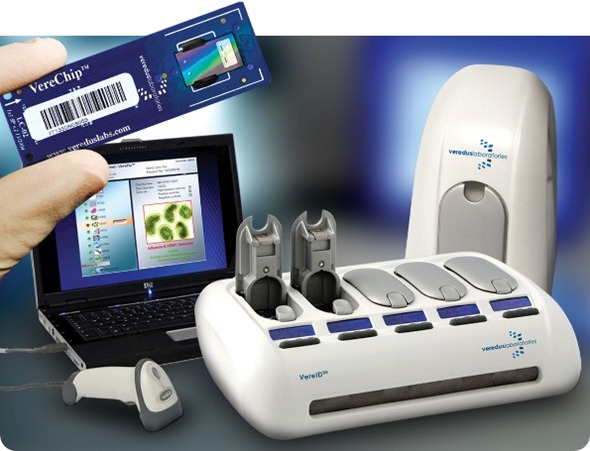Jun 23 2011
Veredus Laboratories, a leading provider of molecular detection tests, and its technology partner, STMicroelectronics (NYSE: STM), today announced the successful development and deployment of VereFoodborne™, a Lab-on-Chip application that is able to detect 10 to 12 food-borne pathogens in one test, including the Shiga toxin-producing Escherichia coli (E. coli) responsible for the recent severe food poisoning outbreak in Europe.
VereFoodborne, based on STMicroelectronics’ Lab-on-Chip platform, is a portable Lab-on-Chip application that can detect and differentiate food-borne pathogens including E. coli, Shiga toxin-producing E. coli (including E. coli 0157 and E.coli 0104), Salmonella, Listeria and Campylobacter. The ability of the VereFoodborne chip to simultaneously lock on multiple segments of the genes of food-borne pathogens enables it to identify bacteria and viruses with a much higher degree of confidence compared to other tests. This capability is made possible with a microarray on the chip that allows it to detect multiple pathogens in one test, saving time and resources over existing approaches. 
“We started the design and development of VereFoodborne about two years ago, and this solution has come at an opportune time given the current outbreak. VereFoodborne is ideal for use in the testing and surveillance of food,” said Dr Rosemary Tan, Chief Executive Officer of Veredus Laboratories. “VereFoodborne is already being deployed to several pilot users in Asia and we are anxious to have it protect consumers from food-borne pathogens.”
“In the face of mutations and changes in the profile of the pathogens we need to detect, the combination of ST’s Lab-on-Chip platform with Veredus’ molecular diagnostics expertise stands out as a powerful tool in the ability to provide rapid and accurate identification of pathogens and adaptation to new challenges,” said Anton Hofmeister, Group Vice-President and General Manager for ST’s Microfluidic Division.
VereFoodborne will be a very powerful tool for health authorities and the food industry to carry out food safety surveillance as well as poisoning-outbreak investigation.
With this tool, health authorities can speed up their investigations of food-borne poisoning outbreaks. VereFoodborne’s faster testing means the health authorities can eliminate ‘suspects’ faster and zero in on their ‘culprit’ pathogen more accurately. This would lead to faster containment and stop the spread of infection early on. Wrong ‘suspects’ in a poisoning outbreak investigation, which could be a shipment of farm produce, for example, can be released from quarantine faster, avoiding unnecessary costs and spoilage of goods.
Major food companies, on the other hand, vigorously test all their ingredients pre and post processing. The traditional method, which takes much longer to complete, means that perishable ingredients need to be held-up longer in storage while their shelf-life clock is ticking away. Smaller companies, which normally would depend on central labs, can also now carry out their own testing at a lower cost and shorter time if they use the VereFoodborne.
About VereFoodborne™
VereFoodborne lab-on-chip chip developed by Veredus Laboratories, a Singapore-based medical diagnostics company in conjunction with STMicroelectronics, a global leader in silicon chip design and manufacturing. It is a portable lab-on-chip application for rapid detection of all major food borne pathogens in a single test. Unlike existing diagnostic methods, VereFoodborne is a break-through molecular diagnostic test that can detect pathogens with high accuracy and sensitivity, within two hours of providing genetic information on the infection that traditionally would take between days to weeks to learn. With its high level of automation, users outside the traditional lab environment can easily perform the tests at the point of need.
About Veredus Laboratories Pte Ltd
Founded in 2003, Veredus Laboratories Pte Ltd is a privately held, life sciences company that develops, commercializes and manufactures diagnostic tools that are marketed worldwide. Veredus offers highly sensitive and user-friendly molecular diagnostic tools that include gel based detection kits and VereChipTM that utilizes the latest cutting edge Lab-on-Chip technology. Veredus’ VereChipsTM are driven by VereIDTM Biosystem. Veredus’ first Lab-on-Chip product was released in 2008 and focuses on the global threat of influenza, called VereFluTM. This is followed by the release of the VereThreatTM chip in early 2009, which allows for bio-surveillance for the first line of defence in places of need. Veredus has also been well recognized in the industry, receiving multiple awards such Red Herring Asia 100, Red Herring Global 100, Asia Innovation Award (Gold) and BioSpectrum Editor's Choice Emerging MedTech Company of Singapore within the few years of her establishment. For more information, please visit www.vereduslabs.com.
About STMicroelectronics
STMicroelectronics is a global leader serving customers across the spectrum of electronics applications with innovative semiconductor solutions. ST aims to be the undisputed leader in multimedia convergence and power applications leveraging its vast array of technologies, design expertise and combination of intellectual property portfolio, strategic partnerships and manufacturing strength. In 2010, the Company’s net revenues were $10.35 billion. Further information on ST can be found at www.st.com.